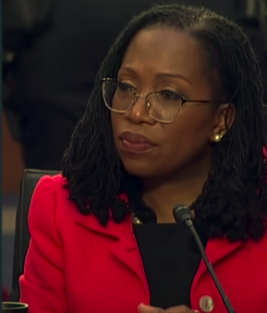After 12 hours of testifying before the Senate Judiciary Committee on Tuesday night, Judge Ketanji Brown Jackson, the first Black woman nominated to the U.S. Supreme Court, was questioned by Sen. Alex Padilla (D-CA) on voting rights and tribal sovereignty.

Judge Jackson is a Harvard graduate and a former public defender. If confirmed, she will be the first public defender on the Supreme Court. However, if confirmed, the ideological balance of the Supreme Court won't be changed; it will stay six conservatives to three liberal justices.
When confirmed, Judge Jackson will potentially be taking the place of the retiring Justice Stephen Breyer who she worked for early in her career.
Sen. Padilla questioned Jackson on what she believes the role the judicial branch plays in upholding the fundamental right to vote. He explains how when he was California’s Chief Election Officer, it was his job to ensure safe, secure, and high participation in elections.
“Can you just share for a couple of minutes what you believe the role or responsibilities [of the] Supreme Court might be in protecting this fundamental right to vote and by extension, our democracy?” Padilla asked Jackson.
Want more Native News? Get the free daily newsletter today.
Judge Jackson asserts that the right to vote is protected by the Constitution saying:
“The Constitution makes clear that no one is to be discriminated against in terms of their exercise of voting. And the Congress has used its constitutional authority to enact many statutes that are aimed at voting protection. There are also laws that relate to ensuring that there is not only voting access, but ensuring that that isn't fraud in terms of voting.”
She continues, “These concerns are embodied by various laws and provisions, and there are disputes at times over the concerns in the balances that are being made across the country relating to the exercise of voting, and those disputes come to court and then eventually to the Supreme Court that interprets the laws that pertain to the to the fundamental right to vote, which, as you say the Supreme Court has acknowledged is a fundamental right.”
After being questioned on voting rights, Senator Padilla moves on to the question of the importance of upholding tribal sovereignty. He asks: “As a general matter, can you share what your understanding is of the federal government's legal and moral trust, responsibility, and relationship with tribal governments?”
In Judge Jackson’s response, she reaffirmed the already pre-established sovereignty of tribal governments.
“Yes, Senator. It is established in the law, the Supreme Court has established, that there is a special trust relationship between Indian tribes and the federal government,” Judge Jackson responded. “Indian tribes are, as a general matter, considered to be sovereigns, and the relationship is a sovereign-to-sovereign relationship, but it's one in which the federal government has some responsibilities related to the Indian nations, and it's a very, very important care and trust responsibility that the federal government has in terms of making sure that the tribes are recognized and cared for, in the context of our system.”
The full 30-minute questioning can be found here.
More Stories Like This
50 Years of Self-Determination: How a Landmark Act Empowered Tribal Sovereignty and Transformed Federal-Tribal RelationsCherokee Nation Launches Digital Dictionary to Support Language Revitalization
Prairie Band Potawatomi Nation Chairman Addresses Homeland Security Contract
Lancaster County to Recognize Conestoga-Susquehannock Tribe on Massacre Anniversary
How the Gaming Economy Helps Tribes Navigate Shifting Policies
Help us defend tribal sovereignty.
At Native News Online, our mission is rooted in telling the stories that strengthen sovereignty and uplift Indigenous voices — not just at year’s end, but every single day.
Because of your generosity last year, we were able to keep our reporters on the ground in tribal communities, at national gatherings and in the halls of Congress — covering the issues that matter most to Indian Country: sovereignty, culture, education, health and economic opportunity.
That support sustained us through a tough year in 2025. Now, as we look to the year ahead, we need your help right now to ensure warrior journalism remains strong — reporting that defends tribal sovereignty, amplifies Native truth, and holds power accountable.
 The stakes couldn't be higher. Your support keeps Native voices heard, Native stories told and Native sovereignty defended.
The stakes couldn't be higher. Your support keeps Native voices heard, Native stories told and Native sovereignty defended.
Stand with Warrior Journalism today.
Levi Rickert (Potawatomi), Editor & Publisher

